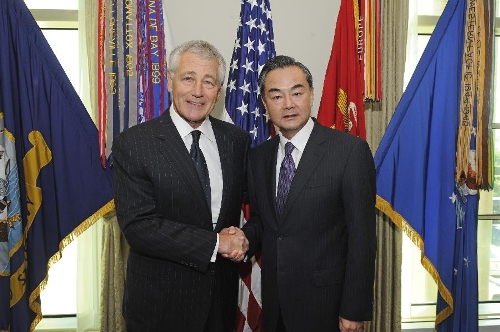China takes new step in Sino-US ties

Visiting Chinese Foreign Minister Wang Yi (R) shakes hands with US Defense Secretary Chuck Hagel at the Pentagon in Washington D.C., the United States, Sept. 20, 2013. (Xinhua/Zhang Jun)
Chinese Foreign Minister Wang Yi has called for "sustained political resolve, persistent commitment and tireless efforts" by both China and the US to turn the proposed new model of major-country relations into reality.
In a Friday speech to the Washington-based think tank Brookings Institution, Wang, on his first official visit to the US since taking office, hailed the consensus reached by Chinese President Xi Jinping and his US counterpart Barack Obama in June on building a new model of major-country relations as "strategic, constructive and path-breaking."
"It has charted the future course for our relations, and will surely produce a positive and profound impact on the Asia-Pacific region and the evolution of the international landscape," Wang said.
Wang elaborated on the essential features of the new model as "no conflict or confrontation, mutual respect and win-win cooperation."
He interpreted "no conflict or confrontation" as the prerequisite, "mutual respect" as the basic principle, and "win-win cooperation" as the only way for realizing the vision.
Wang also proposed five ways for building relations, specifically by enhancing strategic trust, promoting practical cooperation, increasing people-to-people and cultural exchanges, strengthening cooperation on international and regional hot spots and global issues, and prioritizing cooperation on Asia-Pacific affairs.
Guo Longlong, a research fellow at the Shanghai Institutes for International Studies, told the Global Times on Saturday that dissent from some US officials threatened to undermine progress made by both sides.
"Mutual trust between the two countries' militaries - widely regarded as the weakest link in Sino-US relations - needs to improve," Guo said.
Niu Xinchun, a research fellow with the China Institutes of Contemporary International Relations, told the Global Times on Saturday that both countries face a long road ahead because "mutual trust cannot be built with one stroke."
Niu noted that the Xi-Obama summit in June had set a strategic framework, but more talks were necessary to "add flesh and blood to invigorate it."
Making the vision a reality will be a "systemic project" that requires efforts of people from both countries, Wang said, highlighting the importance of Sino-US cooperation in maintaining regional and international stability and promoting sustainable development of mankind.
Tao Wenzhao, a research fellow with the Institute of American Studies at the Chinese Academy of Social Sciences (CASS), told the Global Times on Saturday that trust can only be built through successful cooperation.
China is willing to work with the US to ensure cyber security, fight climate change, defuse the Syria crisis, push forward the Israeli-Palestinian peace talks and solve the Iranian nuclear issue, Wang noted.
The Chinese top diplomat also suggested Beijing and Washington use the Asia-Pacific region as a "testing ground" for forging new relations and cooperating over hot spot regional issues, such as denuclearization of the Korean Peninsula and the transition in Afghanistan.
"The two nations have more converging interests and frequent interactions in the Asia-Pacific region than anywhere else," Wang said, reiterating that China has no intention to push the US out of the region.
Wang also urged Washington to respect China's efforts to oppose separation of Taiwan and seek peaceful reunification in a way that helps "transform the Taiwan question into a positive asset in Sino-US relations."
"This is a new way and concept of pitching the question, which is the most sensitive, complicated and difficult one to solve in bilateral relations," Wang Jianmin, from the Institute of Taiwan Studies under the CASS, told the Global Times on Saturday.
"It relates to China's core national interest and has been hindered in the past by double standards from the US," Wang Jianmin said.
"The pursuit of the peaceful reunification also lies in the national interest of the US, rather than unilateral expectations from the Chinese side," the expert said.
Xinhua contributed to this story